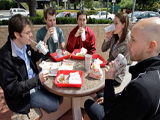California Supreme Court Sides with Employers on Breaks Issue
Post Views 0
Sarah Goldstein, an employment law attorney in Los Angeles, says that the court’s approach seeks to provide balance in the workplace, allowing employees to take their breaks, while also accounting for scheduling flexibility based on the wishes of the employee and the inherent demands of their job duties. The ruling also removes the burden of the meal period penalty payment when an employee voluntarily misses a meal period she added.
California’s top court sided with businesses employers who agued that taking those breaks should be left to employees. The state high court ruling came in the wake of tens of thousands of workers contending that companies evade state labor law requirements by making it impossible to take scheduled breaks. Employers countered that that they should not be forced to police their workers as long as breaks are scheduled and made available.
Justice Kathryn Mickle Werdegar wrote, “We conclude an employer’s obligation is to relieve its employee of all duty, with the employee thereafter at liberty to use the meal period for whatever purpose he or she desires, but the employer need not ensure that no work is done”. Roger Thomson, general counsel at Brinker, operator of the Chili’s Grill & Bar and Romano’s Macaroni Grill chains, interprets the ruling as that company must provide meal breaks and isn’t penalized if servers and cooks choose to work rather than eat.
A San Diego appeals court ruling says employers only have to make breaks available, and not ensure that they’re taken while in a separate case brought by truck drivers against a warehousing company, a Sacramento-based court said companies must ensure that workers are actually relieved of duty.
Worker rights groups, in an effort to avoid employers from understaffing argue that companies must ensure that their employees take breaks, as per court filings.
On the other hand company lawyers can’t be held liable if workers choose to skip rest periods and only violate the law if they require staff to skip breaks.
According to Art Pulaski, executive secretary for the California Labor Federation, the court sided with corporations over the rights of waitresses, health care workers, construction workers, retail workers and others. “The decision unnecessarily muddies the waters on businesses’ responsibility to provide meal breaks, which opens the door for worker exploitation”.
Labor activists bemoaned the ruling and expressed fears that it would embolden unscrupulous managers. “Its’ California taking a step back in terms of protections for workers,” said Joann Lo, executive director of the Food Chain Workers Alliance. She said she feared employers would now “be able to get workers to work more and not have to pay them for it”.
California Supreme Court Sides with Employers on Breaks Issue by Harrison Barnes

